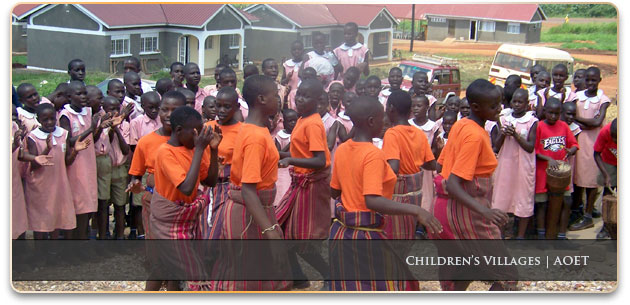Permanent Foster Care For Orphans And Vulnerable Children
As society is continually faced with the challenge of AIDS and vulnerable children, intervention should not introduce new and unnecessary structures to cope with this challenge. Rather, emphasis should be given to strengthening existing community structures that have traditionally provided support to orphans and vulnerable children.
In most of Africa, especially countries AOET operates in, the traditional support mechanism for orphans and vulnerable children is the extended family and community.
Therefore, the primary objective is to encourage and support the extended family and community members to open their homes and hearts to vulnerable children in permanent foster families.
Today, if every family decided to foster one orphan, every homeless child living on the street could be accommodated.
This approach to child care eliminates the gap of unconstructive subcultures that can be formed when children are brought up outside of family environments / institutionalized settings.

In support for permanent fostering, the understanding of family is a loving and caring marriage between a man and a woman with both biological and foster children where all family members accept each other not by merit but by giving unconditional love to one another.
Family is a place where every member has rights of birth and belonging. Family is the core source of life support where parents continue to provide counsel to their children even into adulthood. This approach is fundamental because these youngsters must be mentored during the period when they are forming lasting behavioral patterns.
The age between 6 and 14 years is critical. With the current crisis, many children do not have responsible adults to guide them into healthy behavior during this period. If the children are not taught values by respected mentors, they will develop values based on their experiences. Too many times, the child over values self and under values others.
The issues of HIV/AIDS are embedded in the cultural paradigms and practices in which young people are brought up. Parents and permanent foster parents have the right, responsibility and authority to give relevant and correct information about beliefs, interpersonal relationships, and human sexuality to these young people.
The primary objective of permanent foster homes is to create safe environments where children and youth are able to deal with thoughts, feelings, and experiences that happen during growth. In order to achieve this objective, families, especially those already with orphans and vulnerable children, must be empowered through training and support.
The foster parent helps the child to assimilate into the functional culture of society and to learn the many roles that take place in a family setting. This approach also focuses on the fact that this child will grow and make a home of its own.
The lessons and observations learned in the foster home create the stable foundation on which the child’s future home and family will rest. Healthy behavioral patterns needs to be trained in childhood rather than trying to correct risky behavior in adulthood. The fight against HIV and AIDS starts with the protection and support of these children.

